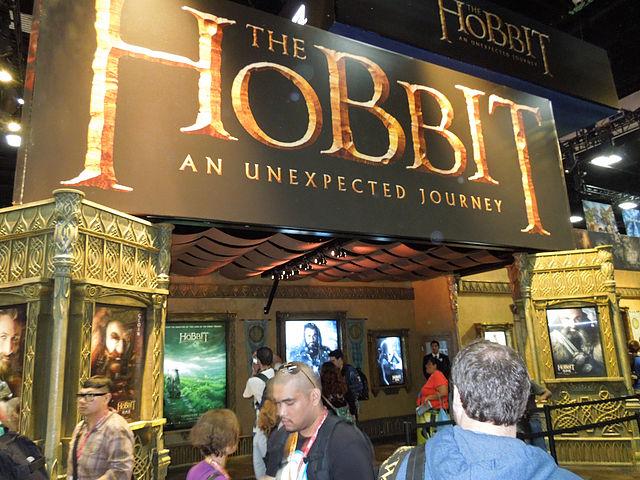‘The Hobbit’ release brings appreciation for Tolkien
The “Hobbit” film is promoted at this year’s Comic Con in San Diego. Tolkien fans have long waited for this weekend’s release. (Photo by Rudy Eats via Wikimedia Commons)
The box office success of the “Lord of the Rings” trilogy has built up expectations for the latest J.R.R. Tolkien film. And with the release of part one of “The Hobbit” trilogy this weekend, one scholar says the significance of Tolkien and the world he created is still evident.
Michael Drout, an English professor at Wheaton College and a Tolkien scholar, says the appeal of Tolkien’s work is his ability to tap into previously neglected deep cultural roots.
“Elves, dwarves, dragons, monsters from the medieval or the Germanic past had sort of become passé or only relegated to children’s stories,” he said. “(Tolkien) reworked this material in such a way that it appeals to almost anyone in an English speaking culture because the words and the ideas are tied in with the language.”
But some film critics and Tolkien purists say the film is stretched too thin. Drout, though, says that’s not an accurate critique of the film.
“What Peter Jackson did in making this film was go to the appendices of the Lord of the Rings and look at what else was happening at the same time The Hobbit was happening. And he brought those story lines in,” he said.
The story lines, Drout says, are skeletal. But when connected to the epic sweep of the “Lord of the Rings,” the film becomes ”The Hobbit” plus, going beyond back-stories and into parallel stories and geopolitical events taking place at the same time.
Drout said in the book there’s a culture clash between the world of the hobbits and the world of the dwarves. In the book, both worlds collide, but the film is almost entirely in the world of the dwarves.
The importance of Tolkien, Drout says, is he complicates everything we think we know about literature and what’s considered to be good literature. Tolkien’s works were a bridge between the medieval culture dropped and the modernist age.
“As we’re looking back on it with a safer vantage point, in some ways (Tolkien) is one of the only writers writing in the second half of the 20th century, who’s dealing with the biggest problems of the 20th century; the nature of evil, the problem of war. By putting it into this fantasy realm, (Tolkien) let’s you consider really touchy issues without being partisan about it,” he said.
But the film, Drout says, is merely good, not great. The biggest problem, he says, came when the screenwriters stopped trusting their text and losing tension out of a scene by elaborating scenes beyond where they needed to go.
“I think it’s a good film but it maybe could’ve been a great film if they trusted their material more,” he said.
